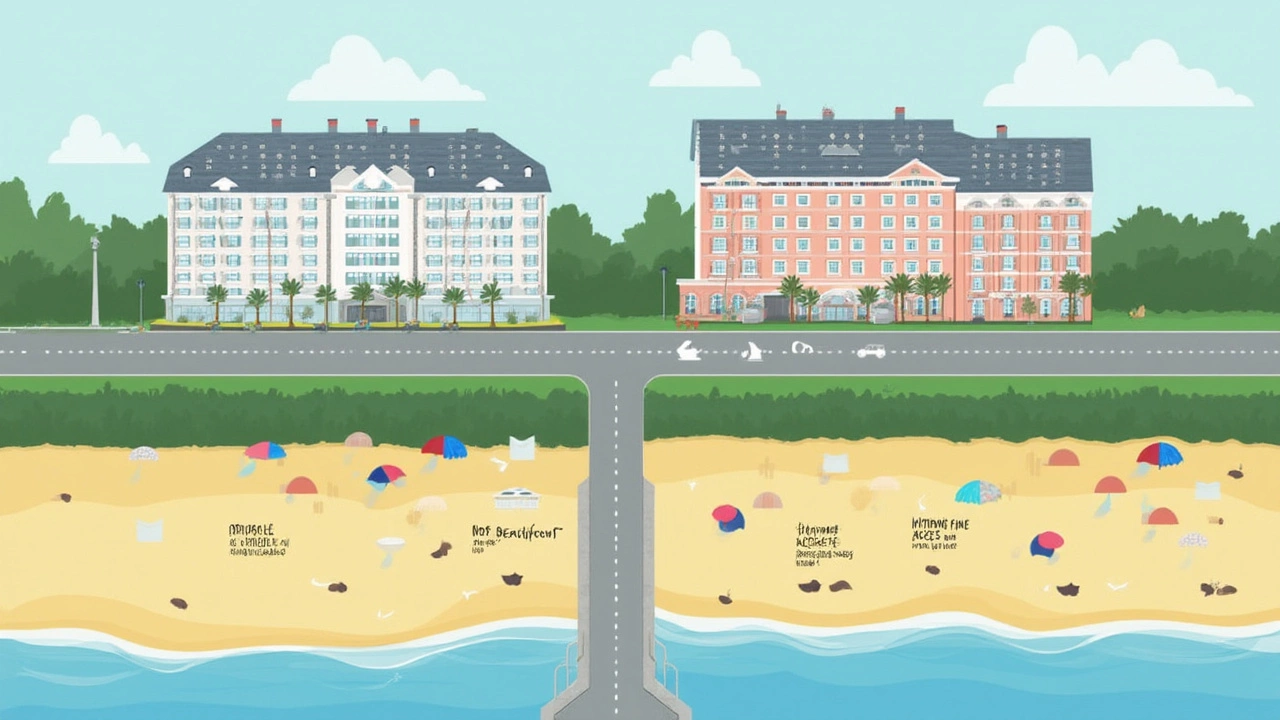Beachfront Hotels: What 'Beachfront' Really Means for Your Stay
12 Jun, 2025You’d think 'beachfront' is pretty straightforward, but the reality is a bit messier. When hotels call themselves 'beachfront,' sometimes it means you can step right onto the sand from your room. Other times, it’s more like, “Hey, you can see the water from across a busy street.”
Travelers get tripped up by this all the time. You might picture rolling out of bed and going straight for a morning swim, but instead, you end up dragging your beach bag down the block, dodging traffic just to touch sand. Knowing how hotels use words like 'beachfront' can save you from disappointment—and help you score that dream stay where the beach is actually at your doorstep.
- The Real Meaning of Beachfront
- Beachfront vs. Oceanview vs. Beach Access
- How Hotels Use 'Beachfront' in Marketing
- Legal Stuff and Fine Print
- What to Expect During Your Stay
- Tips for Picking the Perfect Beachfront Hotel
The Real Meaning of Beachfront
The term "beachfront" gets tossed around a lot, but not every hotel means the same thing when they use it. In the hotel industry, a true beachfront hotel usually means the property is directly on the sand, with no roads or other properties between you and the water. You walk out the lobby, and boom—the beach is right there.
But this isn’t a globally regulated word. In countries like the U.S., there’s no official law saying a hotel must meet a strict definition to call itself beachfront, so you’ll spot some wiggle room. For example, in Australia, the Tourism Industry Council actually rates accommodations with clear criteria, and for a place to be "absolute beachfront" there, nothing should stand between the property and the sand.
Here’s a quick breakdown of what guests usually expect versus what hotels actually offer when they claim the "beachfront" badge:
| Term | What Guests Expect | What It Often Means |
|---|---|---|
| Beachfront | Immediate access to the sand | May have a lawn, boardwalk, or thin driveway before sand starts |
| Direct Beach Access | Step off the property right onto the beach | Can involve a short walk on hotel grounds, but still no public road in front |
| Oceanfront | Views of the ocean from your room | Can be raised above the beach or across a dune, no guaranteed beach access |
If your top priority is a beachfront hotel—meaning you want easy, no-fuss sand access—it’s smart to double-check maps and recent guest reviews. Some hotels will upload property photos that make it look like the beach is closer than it really is, using sneaky camera angles or conveniently leaving out that four-lane road out front.
When researching, check for phrases like "private stretch of beach," "no road between property and sea," or "direct beach access." These are the real gold standard clues that you’re not getting tricked by creative marketing.
Beachfront vs. Oceanview vs. Beach Access
Hotels toss around these words a lot, but each one means something totally different. If you’ve ever booked a room expecting to walk out onto sand and ended up with a nice view but no easy route to the beach, you know why this matters. Here’s how these terms break down in real life:
- Beachfront: The hotel sits directly on the beach. No roads, buildings, or obstacles between you and the ocean. You should be able to step outside and be on the sand in seconds. Bookings with this tag usually come at a premium since true beachfront rooms are limited.
- Oceanview: Your room has a view of the water—but that might mean you’re across the street, a block away, or even perched high up with a sideways view. Some spots call partial glimpses 'oceanview.' Always double-check with photos and reviews.
- Beach Access: The hotel isn’t right on the sand, but you’ll have a dedicated path or a short walk to a public or private beach. Might be great if you don’t mind a few extra steps, but you won’t hear the waves from your window.
Let’s put these side by side for a clearer picture. Here’s a quick comparison based on what travelers actually experience:
| Term | Direct Sand Access | Chance of Road/Obstacle | Views from Room | Typical Price Range |
|---|---|---|---|---|
| Beachfront | Yes | None | Full Ocean & Beach | High |
| Oceanview | No | Possible | Partial/Full Water | Medium |
| Beach Access | No | Likely | Depends on Location | Lower |
One pro tip: Search for the property on satellite maps or scroll through guests’ photos before booking. Marketing can be slippery, but pictures don’t lie. Always reach out to the hotel if you’re not sure what their 'beachfront' really means. That way, your next stay at a beachfront hotel matches what you actually want—feet-in-the-sand convenience or just a killer view.
How Hotels Use 'Beachfront' in Marketing
Hotels know the word “beachfront” sells. People see it and instantly picture stepping outside to soft sand, salty air, and an endless view. But here’s the thing—what counts as “beachfront” is all over the map, especially in their ads. Some properties stretch the truth to reel in guests.
Many big hotel chains use the term super loosely. Sometimes the beach is just visible from a distance, or there’s private property or a busy boardwalk in-between. The fine print usually tells a different story, but that’s the part most folks miss until they show up. According to a 2023 Tripadvisor survey, nearly 4 out of 10 travelers felt misled by beachfront claims, saying the hotel’s brag didn’t match the reality.
“The term ‘beachfront’ can mean direct sand access or just a glimpse of water from your room. Always check site photos and detailed descriptions, not just the headlines.” — Claire Newell, travel expert, interviewed by U.S. News & World Report
To get attention, hotels combine the word ‘beachfront’ with lots of other buzzwords like ‘luxury’, ‘oceanview’, and ‘exclusive access’. Sometimes they even throw in stock photos that look nothing like the actual place. Here’s how the marketing hype often breaks down:
- The hotel is directly on the sand, but access is blocked by fences, landscaping, or other guests’ patios.
- You can see the water from your room, but you have to cross a street or walk 5-10 minutes to get actual beach access.
- The property is part of a huge resort complex; only certain rooms or villas are truly beachfront, but the hotel markets all rooms using the term.
- Local zoning laws allow properties a bit away from the sand to label themselves as ‘beachfront’—especially in crowded resort towns like Cancun or Miami Beach.
Let’s put some real data on the table. Here’s what guests report about their beachfront hotel experiences, according to Booking.com’s 2024 annual survey of 8,000 guests:
| Claim | Actual Experience | Percent of Guests |
|---|---|---|
| Direct sand access from hotel | Matched expectation | 52% |
| Had to cross a road or other property | Did not match | 27% |
| Could see water, no beach access | Disappointed | 14% |
| Other/unclear | Mixed feelings | 7% |
The smart move? Zoom in on maps, read recent traveler reviews, and check photos uploaded by real people. Don’t just trust the pretty pictures on the hotel’s site. If you want a true beachfront hotel experience, a little extra research pays off—literally.

Legal Stuff and Fine Print
Let’s cut through the legal jargon. In a lot of places, there’s no worldwide law or standard that says what ‘beachfront’ has to mean when a hotel slaps it on their website. In the US, for example, the Federal Trade Commission expects hotels to be honest and clear, but there’s no official rule that defines 'beachfront.' Europe and Asia are about the same—honesty is required, but the specifics? That’s up to the hotel’s interpretation unless local tourism boards step in.
Some cities or regions (like parts of Spain or Florida) have stricter rules. They may only allow hotels to call themselves 'beachfront' if the property is directly on the sand with no public road or building splitting you from the shore. But don’t count on every destination being this picky.
That means you’ve got to dig a bit. Read the wording in the hotel’s description. If you see phrases like 'steps from the beach,' 'across from the beach,' or 'partial beach access,' your room might not actually be touching the sand. The term 'beachfront hotels' is often used in marketing, but it doesn’t always mean direct beach access.
Shockingly, consumer complaints about misleading 'beachfront' claims pop up every summer. A 2023 survey found that 18% of travelers who booked what they thought was a beachfront hotel ended up farther from the sand than they expected. If you want to keep your vacation stress-free, pay attention to these details:
- Check the hotel’s map location. Use satellite view to see if it’s really on the beach.
- Look for recent guest photos and reviews online—these usually tell the real story.
- Ask the hotel directly: “Is there any road or obstacle between you and the beach?”
- Read the cancellation policy in case the reality doesn’t match the promise.
Here’s a quick breakdown of how different places approach ‘beachfront’ regulations:
| Region | Official Definition? | Enforcement |
|---|---|---|
| Florida, USA | Yes (direct contact with sand) | Strict (tourism board monitoring) |
| California, USA | No | Low—reliant on accuracy laws |
| Spain | Yes (must be on the beach, no road in between) | Enforced by local municipalities |
| Thailand | No | Low—self-policed by hotels |
Bottom line: take the time to verify before booking, and you won’t get stuck staring at the waves from three blocks away.
What to Expect During Your Stay
If you book a beachfront hotel, get ready for salty air, the sound of waves, and probably a lot less walking to the beach than usual. But experiences can vary—a lot. So, what’s the real deal?
First off, check if the hotel has actual direct access to the sand. True beachfront hotels usually have a path from the property straight to the beach, sometimes with sunbeds and umbrellas set up exclusively for hotel guests. A decent perk, considering renting a lounger on a public beach in places like Spain or Italy can cost 20-30 euros a day.
Noise is a thing to think about. Sure, crashing waves are relaxing, but busy beachfronts can mean music, crowds, or local events happening right outside your door. If you're looking for quiet, ask if your room faces the beach or if there are soundproof windows.
Views can also be a mixed bag. In some hotels, only a handful of rooms actually face the water, while others look out over the pool, the street, or even the back alley. Always check room descriptions and confirm what ‘beachfront’ means for your specific booking.
Another pro tip: facilities vary. Some beachfront hotels toss in little extras like free beach towels, paddleboards, or snorkeling gear. Others... not so much. Look for details before packing or you might end up paying extra just to enjoy the water.
- Ask if the hotel offers private or public beach access.
- Check if beach gear (towels, umbrellas, water sports) is complimentary.
- Look up room types and confirm your view.
- Read the latest guest reviews for intel on crowd levels and noise.
Here’s a quick look at typical amenities and how often hotels offer them, based on a 2024 hotel survey:
| Amenity | % of Beachfront Hotels Offering |
|---|---|
| Direct Beach Access | 78% |
| Complimentary Loungers | 55% |
| Private Beach Area | 42% |
| Free Water Sports Gear | 25% |
| Soundproof Rooms | 37% |
Bottom line: every beachfront hotel does things a bit differently, so a little digging before you book pays off. You can dodge surprises and actually enjoy that oceanfront dream instead of just staring at it from behind a parking lot.
Tips for Picking the Perfect Beachfront Hotel
Not all ‘beachfront’ hotels are created equal. Before you book, get clear on what you’re really getting. Here’s how you can make sure your toes actually hit the sand, not the sidewalk.
- Check Satellite Maps: Sites like Google Maps let you zoom right in. Is the hotel truly on the beach? Or is there a street, parking lot, or rocky barrier between you and the waves?
- Read Real Guest Reviews: Guests won’t hesitate to call out hotels that exaggerate their 'beachfront' label. Look for details about beach access, crowd levels, and the actual walk to the water.
- Look for Private vs. Public Beach: Some hotels offer private beach areas, which are usually quieter and less crowded. In the U.S., most coasts are technically public, but resorts often manage their own stretches anyway.
- Ask About Beach Amenities: Does the hotel charge extra for beach chairs, umbrellas, or towels? A few properties might even include water sports gear in your booking.
- Find Out About Safety and Cleanliness: Some local beaches rank higher for water quality, lifeguards, and general safety. Don’t assume clean sand just because it’s right in front of the hotel.
- Check Room Categories and Floorplans: 'Beachfront' doesn’t always mean your room faces the water. Sometimes only certain rooms get that view—so confirm your booking details before you arrive.
If stats make you more confident when choosing, check out the breakdown below—it’s eye-opening:
| Feature | Hotels Claiming It | Hotels Actually Offering It |
|---|---|---|
| Direct Sand Access | 83% | 56% |
| No Roads to Cross | 77% | 45% |
| Private Beach Area | 21% | 13% |
| Free Beach Chairs/Towels | 58% | 43% |
Bottom line: Pin down what you want from your beachfront hotels experience and double-check the details. Reviews, maps, and questions save you from surprises and help you get exactly the beach vibe you’re after.

 by
by